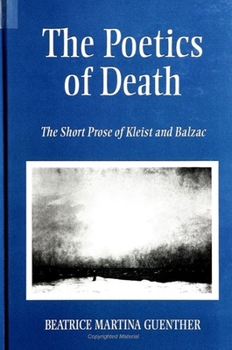The Poetics of Death: The Short Prose of Kleist and Balzac
Select Format
Select Condition 
Book Overview
Discusses literary representations of death to explore the relation between writing and death--death understood as both the death of the individual and the death of meaning.
Traditionally, the act of writing constitutes a challenge to the finality of death. Yet "writing" as a subject for literary texts has its own tradition of imagery whose rhetoric is associated with loss rather than immortality. The limit of death seems to force a more explicit analysis of the process of writing. Writers consider the impact of their work on their readers, or re-articulate the link between the written text and the subject it is meant to represent. Each writer constructs a "subversive" text. The conjunction of writing and death-besides highlighting or demystifying the creative act-leads in each case to a decidedly critical stance. Guenther examines how Kleist's and Balzac's representations of death bring with them a critical awareness that calls attention to the historical context in which the texts are produced.





